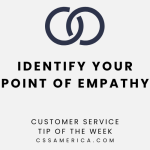Some people are born almost like a master at communication. They know how to establish rapport with just about anybody, and they do so in a way that seems so natural and so real. They can form relationships and be laughing with somebody they met two minutes ago like it’s someone they’ve known for years.
But for most of us, it’s not a talent or quality we were born with; it’s something that we need to work on, and in customer service there’s a lot of benefits to being able to establish rapport and begin to develop a relationship.
It could be a new customer that you’re wanting to provide a great experience to and lay the groundwork for a long-term relationship. Maybe it’s an existing customer that’s coming in a little irate, griping a little bit, who’s a little bit upset. One way to take away some of the emotion and disarm them is to find some common ground so it doesn’t seem so adversarial.
There are ways to communicate that foster these connections, and we’re going to address some topics you can discuss in a 2-Part series. For this week, Part 1 of our focus on the topics that create these connections is About Them and You:
About Them and You
Noted below are 3 categories of connection points that are more about the people involved – you and the customer.
Background – Where were they born or grew up? Where have they lived in the past or currently reside? What type of work have they done or do they do today, and in what industries? What types of organizations or initiatives have they been a part of over the years?
Experiences – What are their hobbies? What do they like to do to relax or stay active? Where have they vacationed, what are their interests, and what are their leisure activities?
Friends/Relatives – Are they a parent? Do they have siblings or friends with whom they do things? Do they live near family, or are they traveling to visit? Are they a pet lover?
If you uncover some of these points, you may find some things that you can relate to about the other person, and they can relate to you a little bit better, as well. By either asking the questions directly when appropriate or just doing an exceptionally good job at listening to the details of what they share, you can establish that rapport.
Find some Personal Connection Points.
Signup for FREE Tips! Contact Us More Resources for You Visit Our Home Page
























